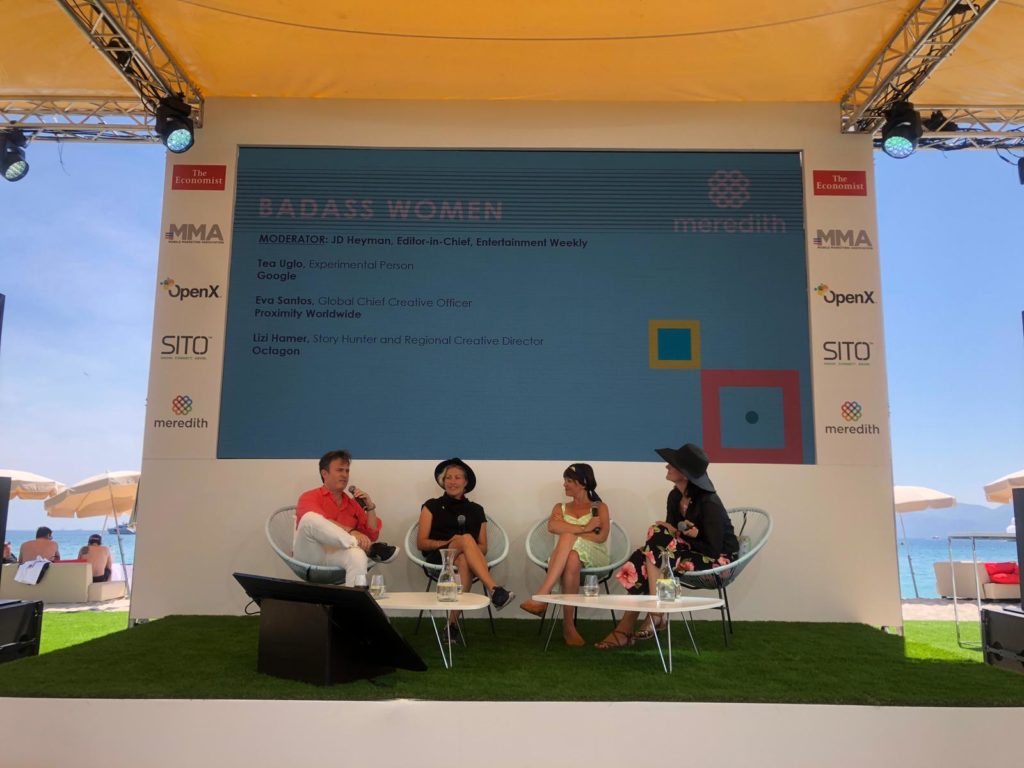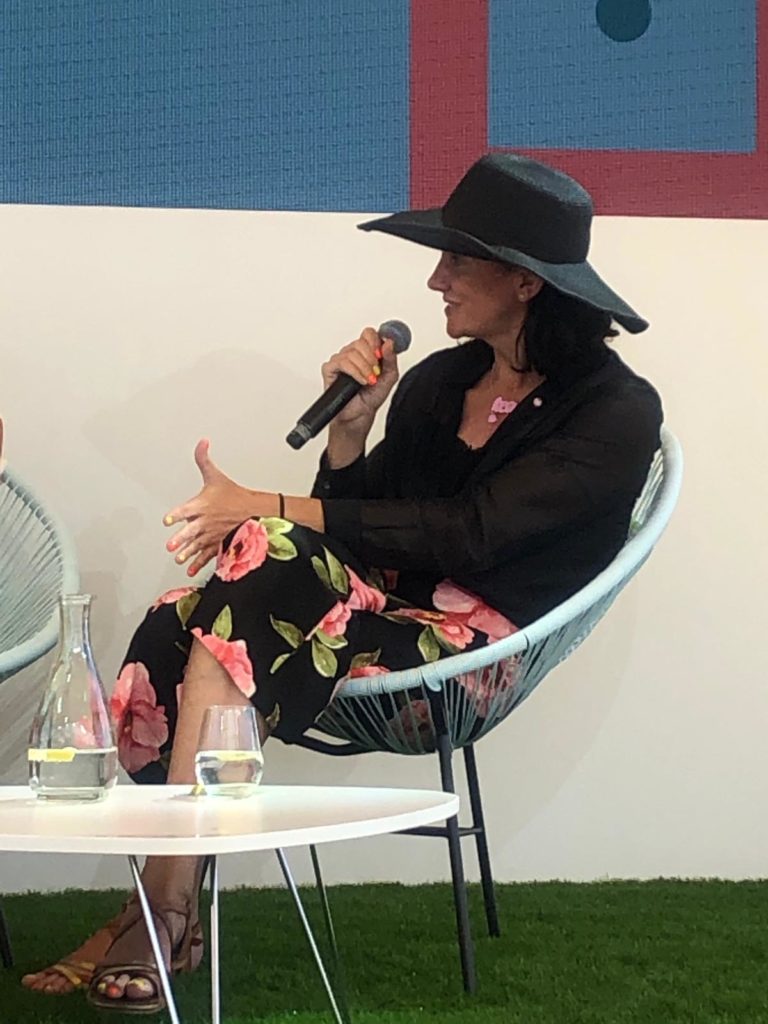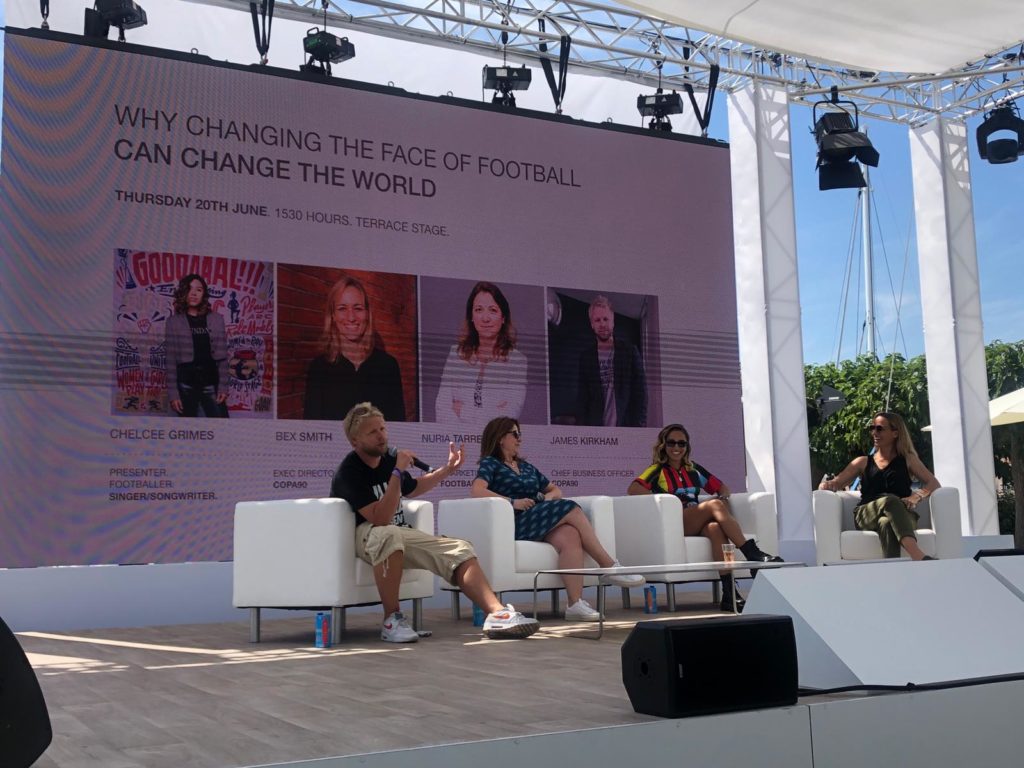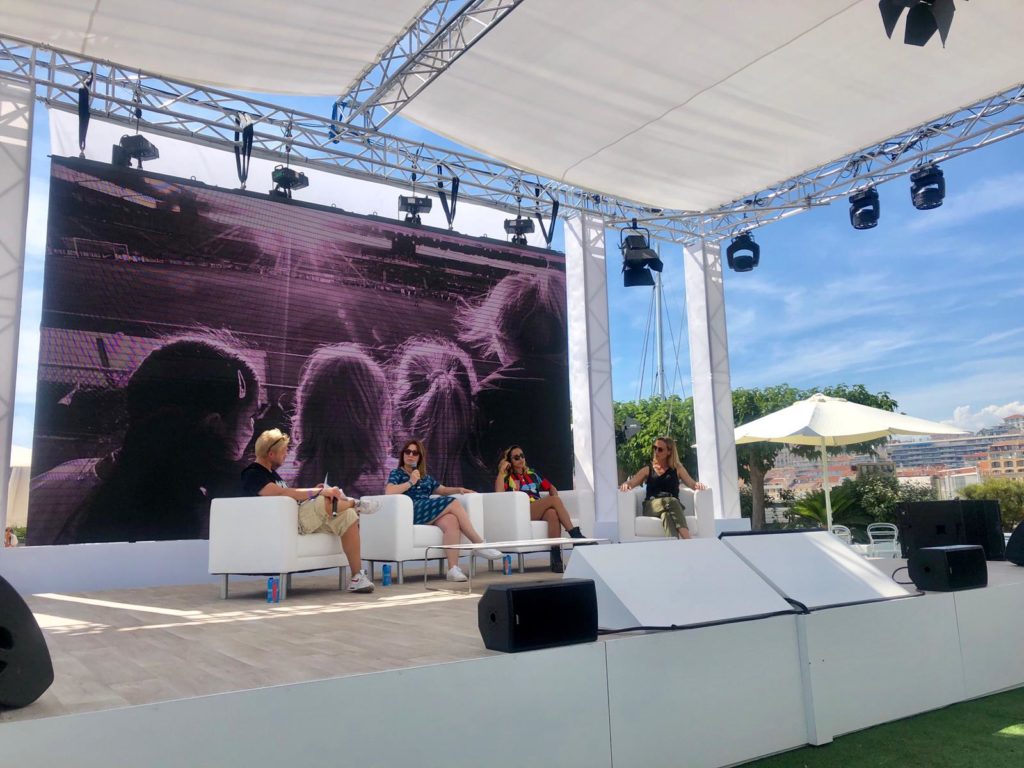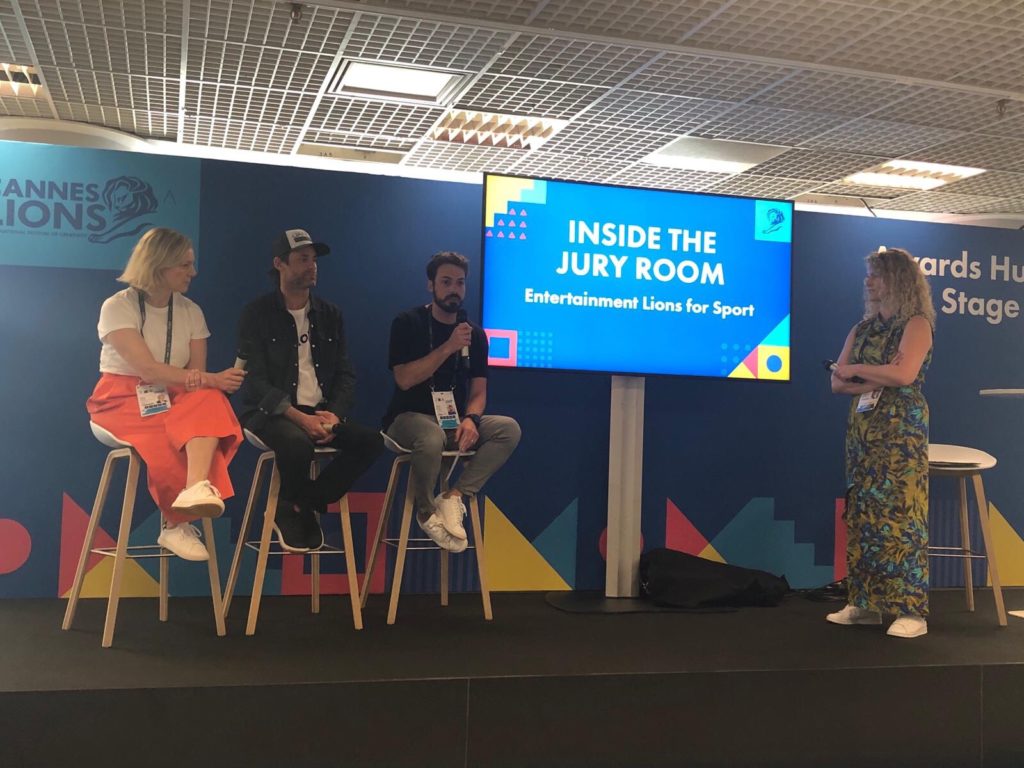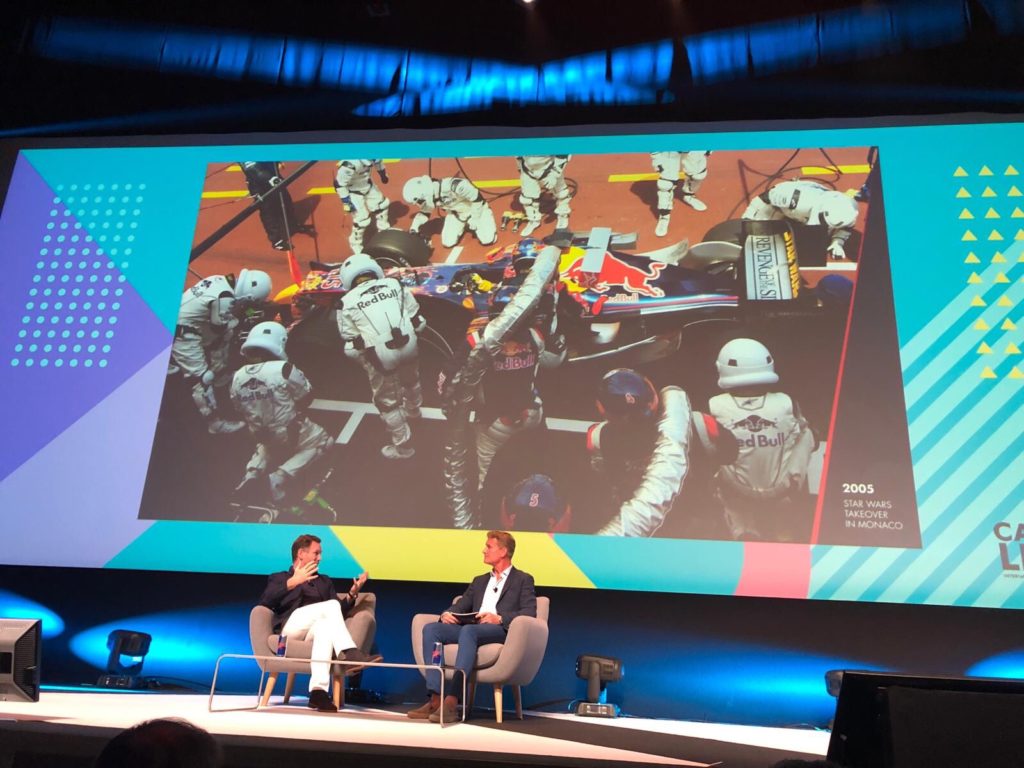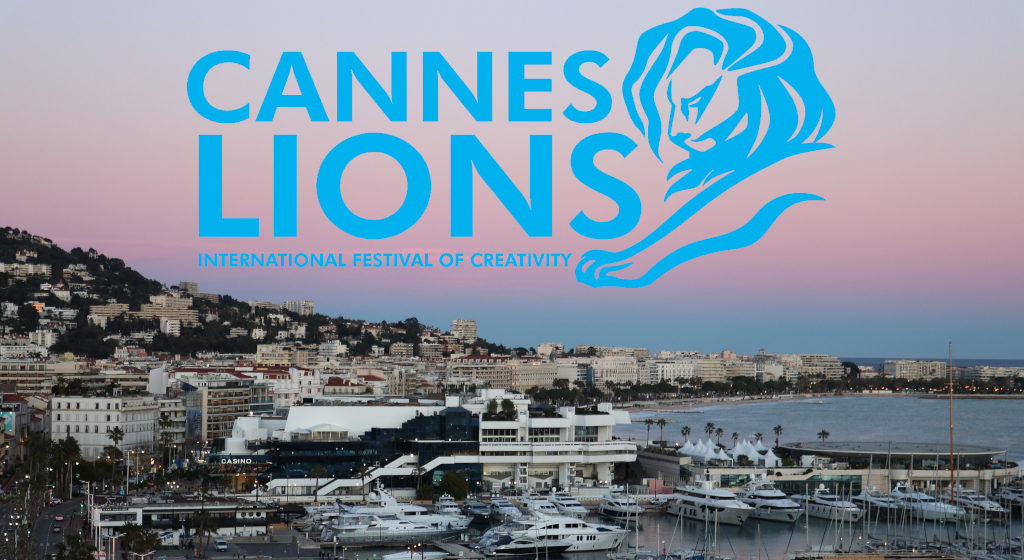
By ESA Board Director, Katie Traxton
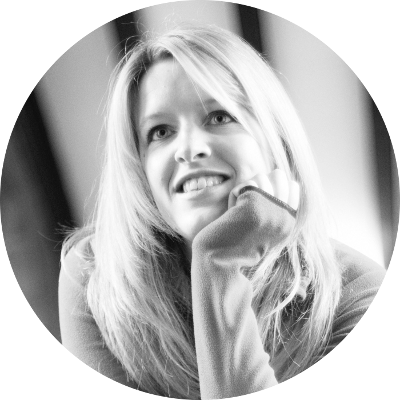
Missed out on Cannes Lions this year? Here are ESA’s top takeaways in 60 seconds:
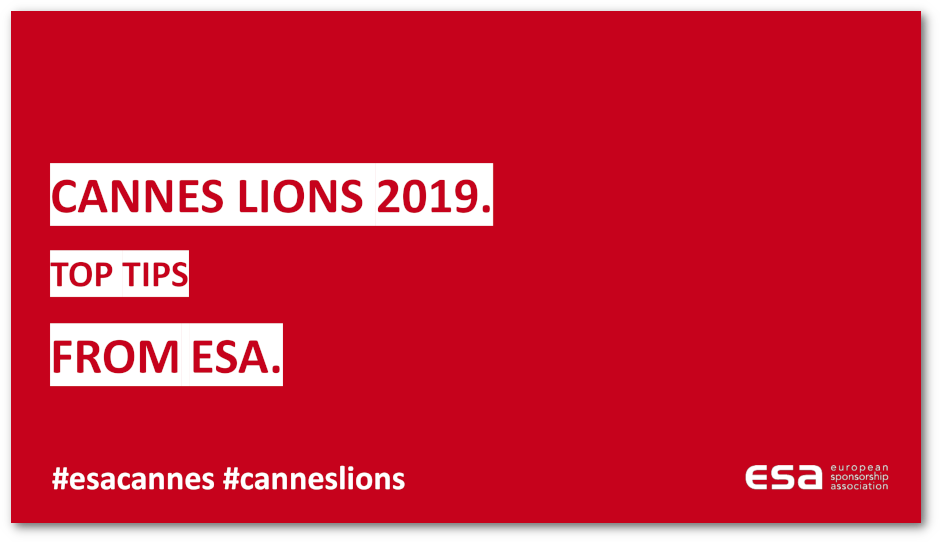
Friday 21 June 2019 – Taking pride in our partnerships
It’s our last day in Cannes, which comes with a tinge of sadness, but also triumph over the new creative highs celebrated, satisfaction over the announcement of the first ever Entertainment Lions for Sport and anticipation of what we’ll get to see, learn and have our minds blown by this time next year.
Before we sign off, we have time for one final blog. Who better to feature than Tea Uglow, Creative Director of Google Creative Lab in Sydney. It’s hard to do Tea justice in only a few words, so I’ll use her own – on Twitter: “[TEA. Like the drink.] I work for Google on atypical creative projects and talk about doubt, reality, tech, being trans, and inclusion.”
Tea’s experience in Europe and Asia-Pacific, in creativity and tech innovation, sitting at the heart of one of FAANG’s (Facebook, Apple, Amazon, Netflix, Google) world dominators, makes her the perfect person to round off the week. A role model to us all, this remarkable woman says she “Doesn’t know what she does”, embraces failure as a rich route to learning and encourages us to “Enable people in your teams to understand that they do not have to be right.”
With all that whirring through our minds, what can she teach us about partnerships? Here are some highlights (I could’ve chatted to her all day!):
Question: This year Cannes have introduced the Entertainment Lions for Sport. What do you think about the introduction of this category and what would making a winning entry worthy of a Cannes Lion stand out for you?
Answer: I think one of the most interesting things about sport is that we have a very clear idea of how it should be represented, what winning means, about what masculinity or femininity in sport entails. It’s really interesting when we step back from that and we see athletes who are themselves and can have intersectional value that can bring the rest of the world into their world rather than the sheer macho testosterone that we associate with that material. So those are the pieces that really stood out for me.”
Question: Why are partnerships so important to Google and what boundaries are you pushing with them?
Answer: All of my work is about partnerships. Ideas are nothing without partnerships. Ideas are nothing without the bravery and courage of organisations, partners, stakeholders and broadcasters to explore the boundaries of their audiences and their consumers and understand the edges of what’s possible, because if they don’t explore, or they don’t push, then we’re just left with the same thing, the same thing and the same thing. So for me, when we see technology being used in this way, I think that we’ve often seen breakthrough moments which actually only really require a broadcaster or someone to be brave and get involved.”
Question: It’s Pride month. It’s great to see so much attention being paid to diversity and inclusion across the industry, but do you think all that work promoting the LGBTQ+ community is positive, or is there a risk sometimes of pinkwashing that feels inauthentic?
Answer: Pinkwashing is a phenomenon where brands or associations will use the fact that it’s Pride Month to wave a flag briefly. Then they put their flag back in the drawer for the next 12 months and it’s very frustrating for a community to feel that the voluble support that you’re looking for is really just being used as a tool to sell brands. It’s very very disappointing when the other 11 months are not there. We’re actually in a mixed place right now, there are brands and there are agencies who are really abusing that and there are people doing amazing work where the work is imbedded into the community the whole year. Especially when you’re selling merchandise which is based around a community and the profit from that goes back to the community in a very clear and transparent way. So it’s possible to see both sides and you can scratch a little bit of the surface and it’s pretty straightforward and the point about this is we all know. So anyone in our community knows that this is just a veneer that will be taken off at the end of the month and we won’t hear anything more from you.”
Question: You’re British but work in Australia. What is your experience of how creativity, in particular in sport, differs across different regions, if at all?
Answer: It’s always really difficult to talk about regions because even within regions there’s a massive difference in diversity in all of these spaces and all of these countries. So wherever you are, it’s important to remember that there is no global. Global is not a thing. We don’t have global growth. There are different countries moving at different paces, in different directions, bringing in new ideas. What is true and stays the same, certainly in sport and competition, is this tribal and very primitive thing that will always provoke and excite passions in everyone. So when we see it creatively, we see that common theme coming through, but I don’t think you can compare markets.”
Thursday 20 June 2019 – Women’s football tops the bill against the run of play
Cannes Lions’ sharpened focus on sport this year is perfect timing. This week France is also hosting a major global sporting event: the FIFA Women’s World Cup.
Capital from sponsors is an essential resource if the game is going to grow and be successful. Female players need backing, representation and (potential) fan exposure that male players may take for granted.
Today, gender equality was top of the agenda in Cannes. A packed powerhouse panel from Dove on smashing beauty stereotypes that featured Shonda Rhimes, showrunner of Grey’s Anatomy and Scandal amongst others, used a combination of cause-led purpose, creative thinking and star power to hit home important messages.
Shonda confronted the perception of women as a minority group needing empowerment with the comment:
“There’s nothing niche about being 51% of the population.”
Her point is as relevant to the movement around achieving equality for women’s sport, as to Dove’s #ShowUs campaign, which aims to reflect the true beauty of real women everywhere.
With football being the sport in everyone’s minds and hearts right now, I sought out two people campaigning for more investment – emotional and financial – in women’s football, to hear what they had to say. COPA90’s Chief Business Officer, James Kirkham, and their Global Executive Director of the Women’s Game, Rebecca Smith, lead a team of passionate advocates for the potential growth in the women’s game, its sporting excellence and cultural relevance.
They told me why the game is so important to them (and should be to us), what they’re doing to make a difference, and, of course, what they think about the Sport Lion:
Blog
Question: What do you think about the inauguration of the Entertainment Lions, specifically for sport this year and what do you think about the winners?
James answered:
I think it’s good that sport is now recognised as a separate category. It’s interesting that previously it’s been bundled into other stuff and now it’s being recognised for what it is, as there’s unbelievable amounts of work out there. Perhaps unsurprisingly the Nike piece cleaned up and it’s a wicked film. Hugely emotive and engaging and hopefully people get affected by it in a positive way.”
Rebecca answered:
Sport is such a massive opportunity for entertainment and creativity. There is so much creativity within sport itself, so if you look at some of the best players in the world – like a Messi or a Marta – we love them because they’re super creative and that is just another element of how you put together something that is entertaining. For me it’s a no-brainer that you would have a sports category – it’s awesome.”
Question: So now that the 2019 winners have been announced, what are we going to do for next year? How are we going to raise the bar for 2020?
James answered:
I think I would like to see more innovation. I’ve just had a conversation about how women’s football might innovate on the platforms its on. You can imagine young teen audiences flocking to different platforms and maybe there will be the equivalent of a TikTok for football and that’s where they will consume their content. I’d love to see more tech and innovation beyond the ‘that’s a lovely film’, because that’s always been there, so to see where else we could push it.”
Question: What is COPA90 going to do to raise the bar?
Rebecca answered:
We set our standards pretty high, I’m not going to lie. I’ve never been in an environment that genuinely believes the women’s game should have the same gravitas as the men’s and that women’s football is football. We integrate it into everything we do across our strategy team to our data, research, insights, creative, producing, production and media push. That is a commitment I’ve never seen anywhere, ever, so I’m really excited to just continue, because the investment we made on the World Cup is an incredible platform we can start off of and I’m excited to see where we’re going to go with the innovation we come up with and where James is going to lead us with the brands. Integrating the women’s game and normalising football as how we see it, which is the world we want to live in, which includes women, all different kind of races and religion and doesn’t exclude anyone.”
James answered:
When Bex joined and effectively started this whole thing in COPA90 the thought was inspiring a new generation, full stop. I love the idea that some little girl or boy at some point said, “I properly tuned into women’s football because of COPA90″. One at a time, impacting people genuinely, to help change the face of this game that we love.”
Question: What do you think are the opportunities for partnerships in men’s sport and women’s sport?
James answered:
I think it’s an amazing opportunity. I can’t imagine anything else in our industry that has such open green space in front of it. You’re not tied down with a lot of the issues that men’s football and men’s sport have, with the rights and regulations and the previous and what’s been done before doesn’t exist as much. People seem to be taking a more refreshed “we can try anything” attitude and that is only positive. There is limitless opportunity and that should be properly exciting for anyone involved in it.”
Rebecca answered:
I agree, and I think we’re just scratching the surface on the women’s game. I think the stories that we’ve seen up until now have been very geographically focused, whether that’s in the UK or the US, but in markets where it’s already accepted or becoming accepted. I think that the storytelling, capabilities and capacity for the sport are massive, the stories are existing, so it’s just a case of pulling them all together and putting them out to the entire universe.”
Wednesday 19 June 2019 – 2020 vision
There’s a real buzz around sport in Cannes following the announcement of the Entertainment Lions for Sport winners, but, after the celebrations, the big story is what we can learn and how we can set an even higher standard for 2020 entries. That’s right, we’re already thinking about 2020. Joao Chueiri, a 2019 juror and SVP Marketing at AB InBev wants the industry to be braver: “We want to award stuff that people could be fired for. That’s the attitude we want. Stop being safe.”
Disrupt the norm. Remember when Red Bull F1’s pit crew dressed as Stormtroopers? Christian Horner, Team Principal of Aston Martin Red Bull Racing, thinks that the right partnerships allow us to explore unchartered territories: “We do things differently. We inject a different energy to the stiff and corporate side of Formula 1. We don’t just have the right partners on the car. 60% of them are in the car.”
So what will we see next year and how can sport and sponsorship help take the work and winners we see at Cannes to the next level? I was lucky enough to catch up with Mark Sandys, Global Head of Beer, Baileys and Smirnoff at Diageo, to get the inside scoop on Guinness and their rugby partnership plans:
Question: What do you think about the fact that for the first time this year Cannes Lions have introduced an Entertainment Lion specifically for sport?
Answer: I think it’s a really positive step. It recognises that there’s a lot of really great work going on which is bringing sports sponsorship to life and therefore much like in other categories, this is a way of celebrating and inspiring greater creativity in sport for advertisers like Diageo. It’s really great for the industry.“
Question: What do you think the wider marketing industry can learn from the creativity and innovation that’s happening in sports sponsorship?
Answer: This year, for Guinness, we have become the title sponsor of the Guinness Six Nations Rugby for the first time and it’s interesting for us because it gives us a different role to play in rugby. What we set out to do was contribute to the tournament, improve the fan experience, build woman’s rugby in the Six Nations and support rugby’s aims of rugby for all and building greater inclusivity. Just last weekend, we staged the Union Cup in Dublin which is Europe’s LGBT+ rugby tournament and it was the first time they’ve had a commercial sponsor and it enabled us to give a platform for greater awareness. Ultimately, the way we did this was for the first time ever, we changed the colour of the famous black gates at the brewery to support the Union Cup.”
Question: In terms of finding relevance and the work resonating with your audience, what is it that you can achieve through a partnership that you wouldn’t be able to achieve just doing a brand campaign off the back of the four brands?
Answer: What we get with a partnership that we wouldn’t be able to get on our own is a sense of stature, of being on the inside and of being able to share values with the partner. That’s why I think choosing the right partner and ensuring there is a crossover of values is really important. With Guinness, our values are described as power, goodness and communion and it’s very similar to the way that rugby players describe themselves. They talk about rugby being a game of character and we talk about Guinness being a beer of character, for people of character, so it almost perfectly overlaps. It allows us to work really closely with the partner to understand what their aims are, what their gaps are and therefore what value we can bring to the table in terms of commercial value and making the asset bigger and more effective.”
Question: What are you going to do to take your work to the next level, because Cannes is all about the next level and pushing the boundaries?
Answer: If I speak from a Guinness perspective, we have only just begun. We’ve signed for six years, we’ve done year one and we actually only signed the deal in November for the tournament that was starting on the 31st of January. We now have the luxury of time to go much bigger and better for next year and really what we’re after is rugby flirts. The core audience of rugby is growing, but really the opportunity for rugby and Guinness is accessing that massive group of people who get stimulated by the big events atmosphere and who wouldn’t necessarily be going week in week out, but do get sucked into the excitement around the tournaments. We have an unusual year ahead, because we have the Rugby World Cup and Six Nations, so that interestingly gives us a double focus. We have the tournament where we’re the sponsor and the tournament where we’re the outsider and really, therefore, the role we will play for the World Cup is we will support our home team, Ireland.”
Tuesday 18 June 2019 – Did the winners take it all?
The winners of the first ever Entertainment Lions for Sport were announced on Tuesday evening.
Personally, I was delighted to see The Not-So-Beautiful Game from the National Centre for Domestic Violence on the list of victors. This powerful campaign cut straight through to our hearts, at a time when many home fans (myself included) thought we might burst with pride and celebration over England’s exceptional performance in the 2018 FIFA men’s World Cup. The campaign says the rest far better than I can, but I will add: if you haven’t seen it before, watch it now, it matters.
It didn’t get picked for a Lion because of my opinion though. So what made it and the other 2019 sport winners stand out for the jury? I was lucky enough to find out when I caught up with one of this year’s jurors and Associate Vice-President, Global Partnerships at the NBA, Mark Osikoya.
He gave ESA an exclusive peek behind the curtain, sharing how Dream Crazy won quite so big, what it’s like having the fate of the industry’s greatest work in your hands and why the Lions for Sport, are here to stay.
Question: What was the best entry you saw as a potential winner for Entertainment Lions for Sport?
Answer: The Nike Dream Crazy campaign. I think we were looking for something that had a social purpose, which the Nike advert did. It was brave, with them using Colin Kaepernick, when a lot of brands might have turned away from him. It was of the time, as there were a lot of issues in the US at that time around racism, and choosing that route was brave. They potentially knew there was going to be an impact in terms of their brand and share price, but they still chose to go down that route. So bravery in terms of the subject matter and creativity and excellence in terms of the execution, were really what made that stand out for me.”
Question: Why is it so important to have a Sport Lions category? Why do you think it’s been introduced and why is it relevant?
Answer: Increasingly, brands are using sport as a vehicle to deliver a brand message. There have been significant sporting events over the past few years and I think it’s a response to the way the industry is going and that’s why they’ve done it. The number of entries that we had this year reflects the fact that this is an area which brands use to articulate a message and Cannes Lions pride themselves on responding to the industry over the years, so the introduction of a sport category is just a natural result of that.”
Question: What can creativity in sport teach the wider marketing industry?
Answer: From the entries we judged this year there was a significant percentage which focused on sport for good and using a vehicle like sport, which is something that touches on people’s passions for delivering a positive message. I’m not saying the rest of the industry doesn’t do that, but it feels like a characteristic from the ones we judged, and they can use it as a guide, moving forward.”
Question: What work are you doing in the NBA to raise the bar of creativity in sports marketing?
Answer: The NBA is widely acknowledged as being at the forefront of innovation in sport. I think we’ve embraced new technology in the US through VR, AR and how we deliver the product to fans directly. We’ve been innovative from a US sports background with things like the jersey patch sponsorship, we were the first major US sport to go down that route. Bringing games to foreign markets, this year we will have games in Japan, China, India, Paris and Mexico. In a broadcast area, we’re really focused on giving fans access to the NBA product in a way that works for them. For example, through our League Pass, fans don’t have to buy the whole game, but can purchase literally up to the last two minutes of the game if you are in the US.”
Question: What was it like being a juror for the Entertainment Lions for sport?
Answer: Overall it was a fantastic experience. Very hard work and challenging in terms of the workload and the expectation, but I think that reflects the thought and the effort that people have to put into the applications themselves. I really loved the experience and learnt a lot. I think it exposes you to work outside of your particular sector, whether that be your sport sector, or your geographical sector. You’re seeing work from all over the world and you’re having to make a judgement on that work. It is a really good way to understand the breadth and excellence of the work that is going on globally. All in all, a fantastic experience and one I would like to replicate if possible! “
See the full list of winners
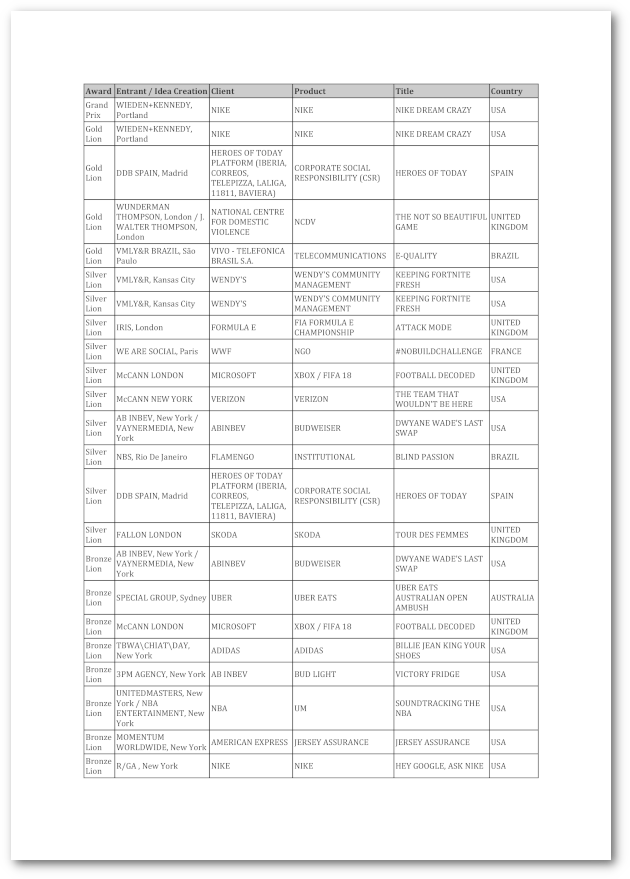
Monday 17 June 2019 – The Paralympics: creating a global impact
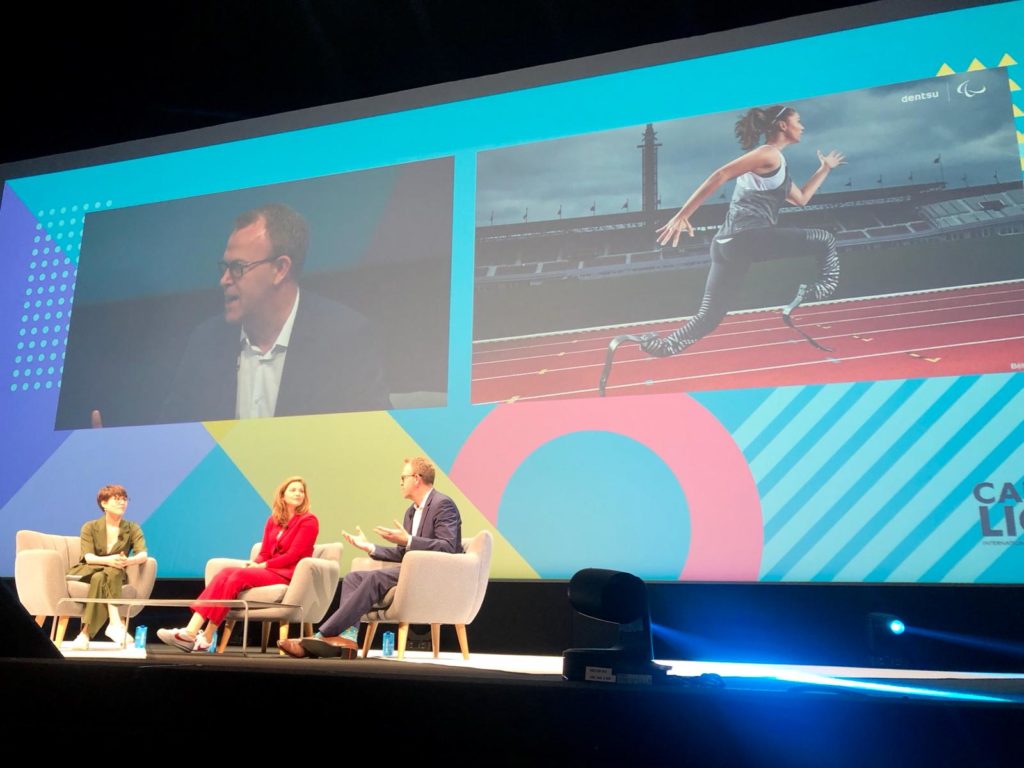
We’re now creeping closer to the first ever Entertainment Lion for Sport being awarded.
Our target this week is to bring you insights from experts that you can’t get anywhere else. We want to find out what the benchmark is for creativity and innovation in sports marketing, how it can be topped and whether sport really can change the world.
Today, I caught up with Craig Spence, Chief Marketing and Communications Officer at the International Paralympic Committee (IPC) after his session on: The Paralympics Impact on our Creativity and Humanity.
In the nine years Craig has been at the IPC, the change in the sporting and social impact from the Paralympics has been phenomenal. Unlike me, you may already know quite what a seismic shift the Paralympics has created, but, just in case you don’t, here’s a little background:
1/6 of the global population have a disability (>1 billion people). Equality is still a work in progress, but the Paralympic movement is determined to change that.
The world’s number one sports event for driving social inclusion (contributing to 11/17 UN Sustainable Development goals), the Paralympics are the third most popular sporting event globally after the Olympics and the FIFA men’s World Cup. They reach 4.25bn people in 160+ countries and after London 2012 changed 1/3 of the U.K. population’s opinions on disability for the better.
The IPC’s vision is to make an inclusive world through sport. We all want that, so what can we learn from them? Here’s what Craig had to say:
Question: What do you think the opportunities are for the Paralympics for greater creativity than we see in other areas of sport?
Answer: I think it’s an unsaturated market. There are very few partners who are activating at the moment, so those who do make a huge impression. You only have to look at Toyota around PyeongChang, Samsung, Allianz and BP. Those types of organisations have really activated their Paralympic rights recently and they’re making a big impact because they’re compared with no-one else. So it’s a blank canvas for any sponsor who wants to get involved in the Paralympics, you can get involved in one of the world’s biggest sporting events, while at the same time fulfilling your CSR strategy, because we are a change organisation and we change the lives of millions of people around the world.”
Question: With your hat on as a consumer rather than a marketer, what sports campaign have you seen that has influenced you personally?
Answer: I think the greatest sports campaign ever done was Channel 4’s Superhumans campaign for London 2012. It was a campaign which engaged people who never had much knowledge of the Paralympics before. They broadcast it on opening night on every single TV channel in Great Britain and it made such a huge impact. I always say it did more in 60 seconds to change attitudes towards the Paralympic Games, than probably the last 25 years of communications activities put together.”
Question: What have you seen that you think could win a Sports Lion?
Answer: I’m really biased when it comes to these types of things, so my recommendation would be the Start Your Impossible campaign by Toyota. They did an amazing advert with Lauren Woolstencroft, a Canadian Para Alpine Skier which was premiered during the half-time of the 2018 Super Bowl. Telling the story of how she was born, missing some limbs and how she had conquered her disability to become a multi Paralympic champion.”
Question: What do you think is the future of sports marketing?
Answer: The future of sports marketing is not the product on the field. It’s the viewer experience, whether you’re watching on TV, at home, or as a spectator in the venue, and how you can get closer to the experience and make it more enjoyable. I think, for the Paralympics, it’s just getting people interested, because I think we’re only scratching the surface of what we can do. In terms of innovation, we’re really excited about putting cameras on wheelchairs at future Paralympics and using technology to really communicate the classifications that are in Paralympic sport, because that’s one of the barriers to engagement. We’re working with broadcasters around the world at the moment to make classification easier to understand.”
Friday 14 June 2019 – Can’t Wait for Cannes!
Next week I’ll be reporting live from Cannes on behalf of ESA. We’re especially excited because it’ll be the first ever Cannes Lions to award the Entertainment Lions for Sport!
Tune in for never-before-seen content with industry leaders direct from the Festival (and the beach!)
For now, we wanted to whet your appetite with a taste of what’s to come from sports and entertainment specialist and 2017 Cannes Lions juror, Misha Sher, who told us what makes a winning entry, why sport deserves its new place in the Cannes line up, and who his money’s on to take home the big prizes this year…
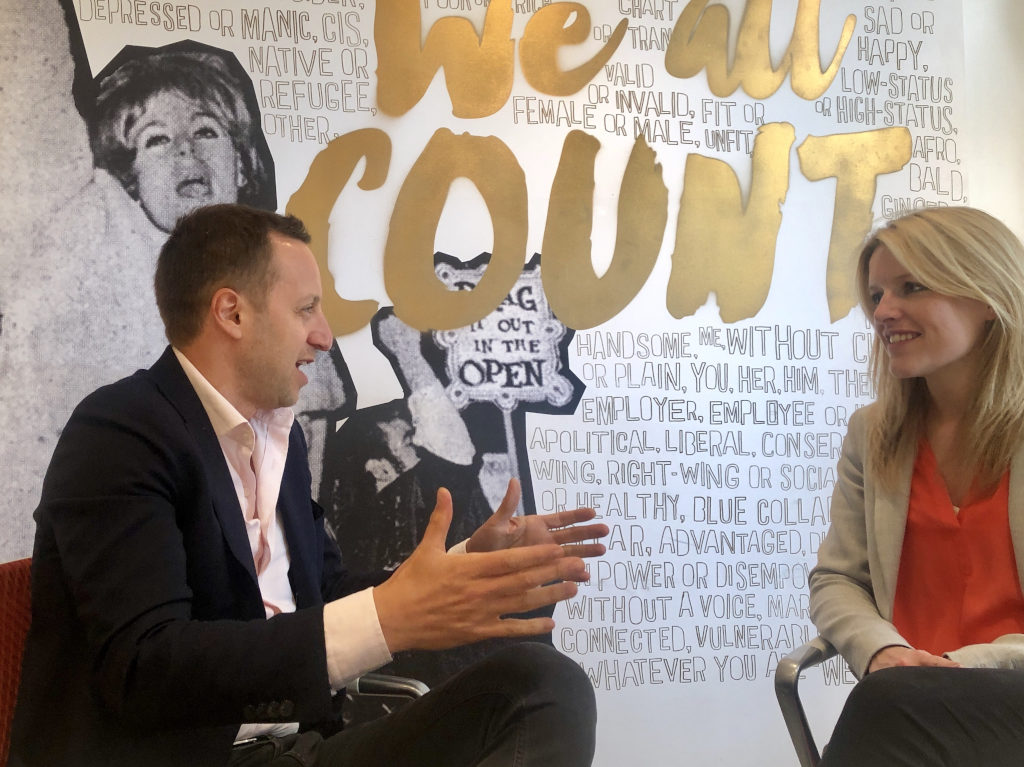
Question: What do you think the most important thing is to make a winning entry?
Answer: I think authenticity is one. Insight, so the truth that fuels it is number two. Three is bravery. Number four is craft, like the way that it’s executed. And the last one is impact. We were looking for something that’s bigger than the sum of its parts.
Question: In 2019 for the first time there is an Entertainment Lions for Sport. You obviously specialise in sport as part of your role. Why do you think that category is now relevant and why was it needed?
Answer: I’m actually quite surprised that we haven’t had sports as a category before, given the size of this industry. Some of the biggest advertisers in the world are using sport to tell stories and communicate with consumers, so it’s only natural that Cannes would have a Lion for sport to look at the breadth of the work and have the debate around what excellence is.
Question: And what did you either judge or have you seen before that you think is the kind of work that would win an Entertainment Lions for Sport?
Answer: There were a couple of entries which I judged which were excellent. One was called the Unlimited Stadium by Nike. They created a running track where people are running against their own avatar. I thought it was just fascinating because again it came out of the insight that ultimately all of us are just competing against ourselves. That’s quite simple, but how they brought that out was phenomenal.
Question: If you had to put money on one Entertainment Lions for Sport winner for this year, what would it be?
Answer: My entry of the year would be Dream Crazy. It wasn’t just my favourite campaign of last year, it was one of the most memorable pieces of creative I’ve seen in a long time. I have huge admiration for the way that Nike can continue to push the boundaries and stay culturally relevant and innovate and use talent to tell stories. I couldn’t think of another individual outside of Colin Kaepernick that could have been part of that ad.
Question: You’re the first jury to have written a book about your experience. What was the thought behind writing that book and what do you think it can offer your average marketer?
Answer: We had an amazing jury. When we finished, we felt there was so much that we talked about and so much that we covered, with incredible debates in there that people unfortunately wouldn’t have the the opportunity to see and our jury president suggested we write a book. We looked at two thousand pieces of work and wanted to share with you where we believe things are going and give an insight into why we felt certain work is great and where we thought some of the brands missed opportunities.
Sign-up to our mailing list as an ESA ASSOCIATE for access to selected Resources and to receive the latest sponsorship news.
Follow us on Twitter @EuropSponsAssoc #esacannes #CannesLions and stay tuned to this page via Twitter for Our Correspondent from Cannes 2019 blog updates
Read Our Correspondent from Cannes 2018 blog.
